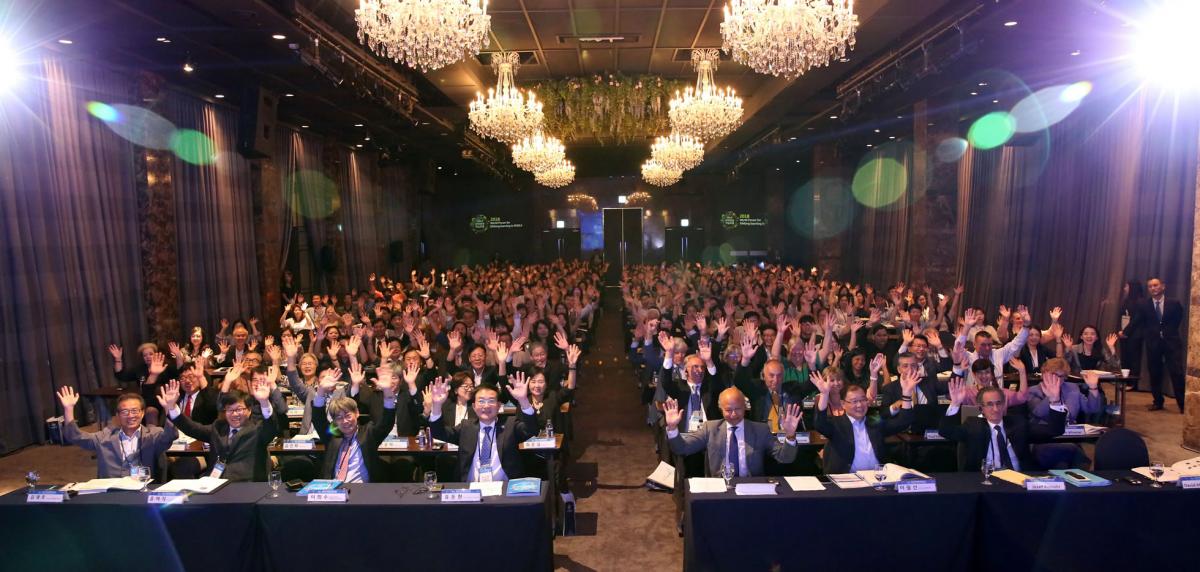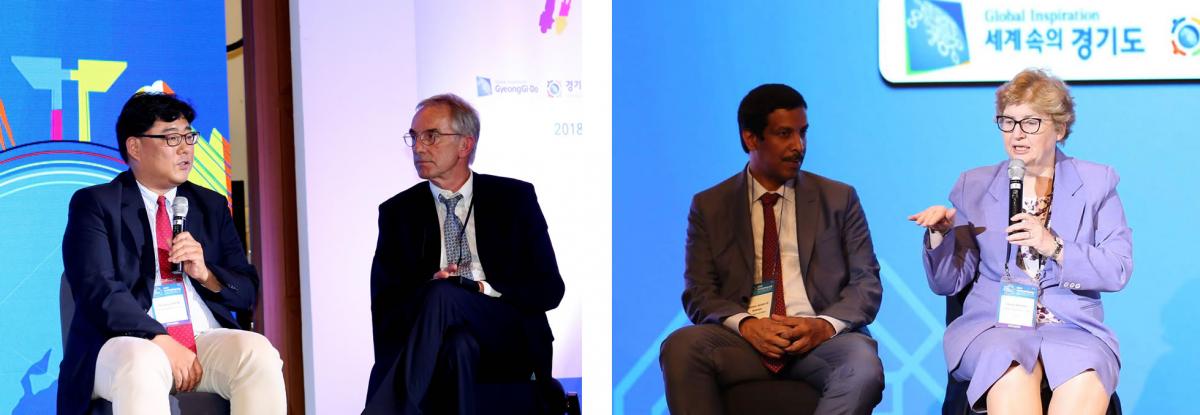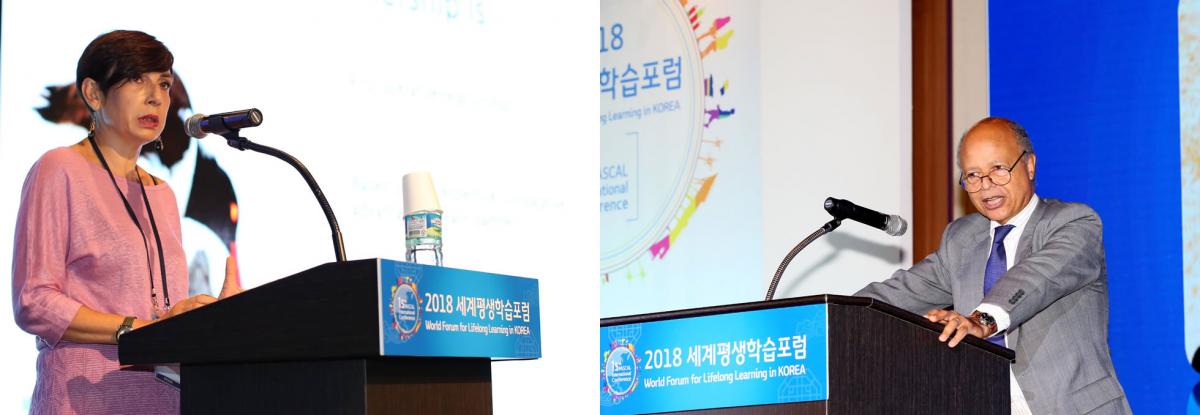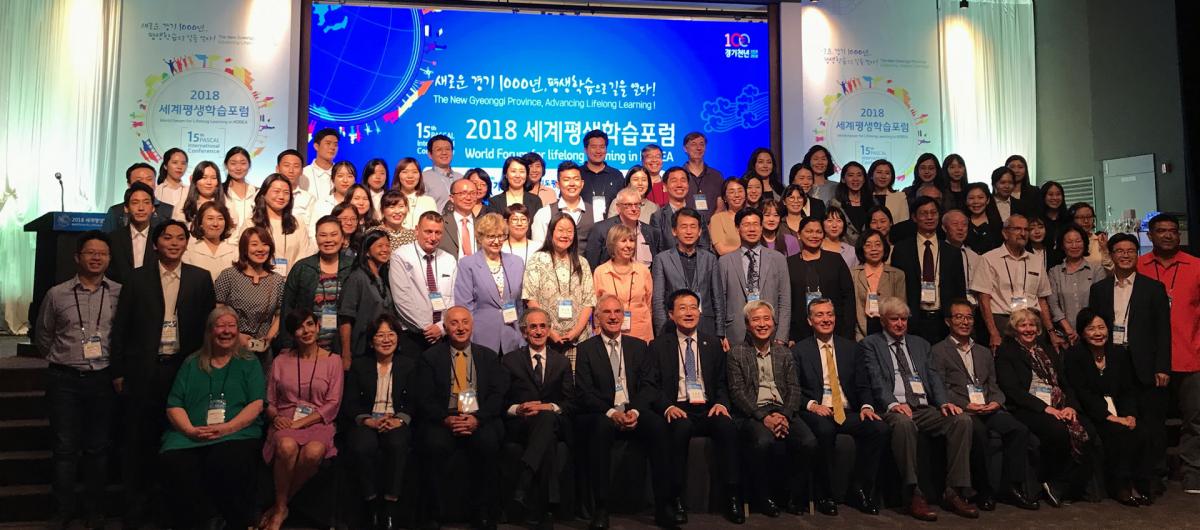A report on the 15th PASCAL Conference - Suwon, Korea, 30 Aug - 1 Sept 2018, by Josef Konvitz, PASCAL Chair
With expectations high, and a programme that filled three days from early morning until mid-evening, this conference was truly a journey. As we shared experiences, as we learned more about how diverse learning city initiatives are around the world, as we deepened our understanding of the issues that define this moment in global history, we resolved to integrate lifelong learning into learning cities – not just to satisfy a constituency that needs to find its place in a crowded policy agenda, but as a means to a greater end, a more equitable, inclusive and sustainable pattern of development.

All delegates at the plenary session
It is impossible to summarize so many papers covering conceptual issues, case studies and challenges for the future. More than 500 people attended the plenary session on 30 August and the Scholars’ Forum on 1 September; over 60 joined in the site visits and presentations on 31 August; and like all good learners, we took away different things. We came from Qatar, Germany, Ireland, the United Kingdom, Italy, the United States, Thailand, Singapore, the Philippines, Taiwan, Australia, and New Zealand. Some represented public bodies, associations and civil society, others professional institutes and universities. My list of highlights is therefore personal; I invite everyone to look at the presentations that are available online.
At the conceptual level: the problem of untangling the economic-environment nexus (keynotes by Shirley Walters and Soonghee Han), and the likelihood for more crises, both economic and environmental, in the years to come, make it imperative that we find better ways to explain why change is both necessary and desirable. Similar themes were developed by Chris Duke and Peter Kearns in the Distinguished Scholars’ Forum on the third day. People of all ages, from children to the elderly, will have to unlearn some ideas and habits, adopt new ones, and adapt. Thus ends the conventional distinction between education, through the tertiary cycle, and lifelong learning as something that comes after (or perhaps not at all). Denise Reghenzani-Kearns (Australia) focused on enhancing later life learning, together with Rob Mark (Glasgow and Dublin), and Choi Ilseon, Professor at Kyung Hee University in Korea. Lifelong learning is inescapable if we are to survive, as articulated in the session chaired by Dorothy Lucardie on lifelong learning to solve community problems, with examples from New York presented by Maria Wong, Gumpanat Boriboon from Thailand, and Kim Jinhwa, Professor at Korea’s Dong-eui University. Problem-solving and lifelong learning were also addressed by Ikeson “Ike” Choi, Professor of Learning, Design and Technology at the University of Georgia (US) in the Distinguished Scholars’ Forum.
Implementation and innovation in the field of lifelong learning can be bottom-up and top-down; in the best of circumstances, both happen. When there is a national policy for national, regional (provincial) and local action, as in Germany (Heribert Hinzen) and Korea, programmes have far greater impact. Internationally adopted principles and guidelines, like the SDGs today, can help in the absence of explicit national policy frameworks. Many case studies however are about bottom-up initiatives, with strong involvement of civil society. There was a collective sense by the end of the conference that PASCAL should try to promote multi-level co-ordination and explicit national policy direction. Governing the learning city was addressed by Raùl Valdés from UNESCO-UIL in the Distinguished Scholars’ Forum. Whether we will ever bring the aspiration of global citizenship down to earth, the learning city concept and the world-wide networks of learning cities are a start.
I did not know that in Germany there are many more adults in learning programmes than there are students in elementary, secondary and tertiary institutions. Measuring impact lags in all countries. Few case studies include information on financing, and studies of benefits remain on the general level covering deep learning, the spiritual dimension, and enhanced well-being. The Korean concept of happiness, as a translation of well-being, seemed convincing in its context, but it might be difficult to adapt to countries in which “value for money” remains key to financing. PASCAL has expertise in the design of indicators and in the communication that follows from their use. (It is no use having data if the results are not intelligible and accessible).
Entrepreneurship, which also received attention at the conference (as was also the case a year ago at the XIVth conference in Pretoria), is more explicit about the links between learning, life-long, and the economy. It matters in Korea – and as we heard in Qatar and elsewhere – where SME creation and growth are critical and inadequate, not only because they typically generate most new jobs, but also because they may be important pathways by which innovation enters the economy, and because they have the flexibility to bring new and more varied social categories into the workplace. Peter Kearns urged us to build a narrative for a humanistic path through the 4th industrial revolution. In complementary remarks, Mike Osborne set out a choice between the model of the smart city as a form of autocratic system, efficient but with diminished public responsibility, and urbanism linked to education and governance. Too often however models of smart cities are instruments of corporate marketing which capture city governments; there has been little reference to education or citizen input in Glasgow’s smart city plans, supported by the UK government to showcase UK technology for export (though much in in its alternative label as a ‘nourishing city’ led from its Education Director); another example of the tension between top-down and bottom-up when the big money is at the top end, and local initiatives may get short-changed.

Hyun Youngsup and Heribert Hinzen (left); Mansour Al Boenain and Leone Wheeler (right)
Place-making was another theme that emerged from several case studies. Together with community impact, a topic covered by Roberta Piazza of the University of Catania, and social networks, presented by Hyun Youngsup, Professor of Lifelong Education at Kyungpook National University, place-making is about specific local contexts. Access is not only a matter of access to the internet – although that is important – but also physical proximity. This is so important for the integration of older people into higher education institutions, to help them become age-friendly. We heard that in Osan City, Korea everyone can reach a learning centre in a ten-minute walk because many public offices and properties made space available for learning. PASCAL was welcomed to Osan City by the Mayor, Kwak Sang Wook, and some very enthusiastic older learners. In Paju, we saw hundreds of children at a unique residential facility, GChangeUpCampus, being exposed to English through specially-composed American-style musical comedies. Place-making will feature prominently in a meeting planned for 13-15 March 2019 in Cork and South Kerry, Ireland, when the focus will be on rural issues.
The contribution of learning cities to SDG 4 (education) and SDG 11 (sustainable urban development with a focus on infrastructure) cannot remain on the higher level of the general and conceptual; it has to be brought down to the specific and concrete. The themes of entrepreneurship and of active ageing are examples of how we can make this linkage between SDGs 4 and 11 more explicit. This will take time, beginning with pilot studies. The estimate that SDG 11 – primarily through networks utilities for water, transport, and power and for better land use - has the potential for the highest rate of return on investment of all SDGs should be an argument in our favour for this linkage, drawing on our emphasis on place-making and human capital.
The Conference gained from the insights and encouragement of Jeong Doek Seo, Life Long Learning Executive Director, Lee Haejoo, Professor, Korea National Open University, Lee Heesu, President of the Korean Society for the Study of Lifelong Education, and Yu Don Hyun, President of Gyeonggi Province Institute of Life Long Learning. Korea, as a rapidly ageing society, innovates in this field in ways which add to its reputation as a forward-looking, responsive society. Kwak Sang Wook, Secretary-General of the Korean National Commission for UNESCO, and David Atchoarena, Director of the UNESCO UIL in Hamburg, helped guide the discussions through their remarks.
 Roberta Piazza, Strand A Leader (left); David Atchoarena, Director of UIL (right)
Roberta Piazza, Strand A Leader (left); David Atchoarena, Director of UIL (right)
There is no lack of subjects and themes that link learning cities and lifelong learning to develop further. The conference in Korea was ambitious, but even so our programme lagged behind recent political events insofar as migration in learning cities and what they can do to address the challenges of integration and cohesion did not get the attention it deserved; migration - and poverty - must be more visible in our future work. Having met twice in Asia in recent years (Hong Kong in 2013, and now Korea), and with our base in Melbourne, Australia at RMIT and a body of individual members in PIMA representing many countries in Asia, South East Asia, New Zealand and Australia, this promising region is challenged by both ageing and environmental sustainability. We met in Pretoria, South Africa in 2017, on the southern edge of a continent where cities are growing more rapidly than anywhere else in the world, where entrepreneurship is vital to economic and social development, and where different forms of knowledge bring modern science and traditional insights into focus. Our centre at Tecnològico de Monterrey should support new work on education and other dimensions of resilience in cities that must become learning cities if they are to recover from disasters, and embrace preparedness. The European centre at the University of Glasgow, through several international projects and grants, is a powerful vehicle for mobilizing academics and practitioners across Europe and between Europe and Africa and Asia, not least because of the UK government’s commitment to the SDGs as manifested in its Global Challenges Research Fund (GCRF).
In the weeks to come, I hope to inform you of progress toward closer co-operation with UNESCO UIL with the objective of producing a book together by mid-2020 combining conceptual chapters and case studies with an evaluation component. This might serve to launch future indicators-based work. We will explore the possibility of another Asian conference in 2020, while developing a project in Mexico that could enable the Tec centre to create its own network in Mexico and South America. And we will renew efforts to establish a centre in the United States where arguably political challenges make the learning city concept of more immediate relevance.
In the past, and hopefully in the future, at PASCAL conferences junior scholars and doctoral candidates have presented papers, benefitting from the comments of senior practitioners and academics in a friendly and constructive forum. Although the programme at Suwon could not accommodate this active form of mentoring, there were opportunities for participants to interact with Koreans just starting their careers.

All international delegates
Our thanks cannot convey fully our appreciation to and gratitude for the support and professional preparation provided by Gyeonggi Province and its Institute for Lifelong Learning, Ajou University and its partners for the Distinguished Scholars Forum, the Korea Institute for Community Education, Lifelong Learning times, the Incheon Times and Goodtree Character School. Many welcomed us at the site visits; interpreters facilitated the flow of presentations; student volunteers guided us in unfamiliar places. Robbie Guevara, PASCAL’s Centre Director at RMIT in Melbourne, helped from the start to shape the programme, secure the participation of many of the speakers and panelists, and co-ordinate with Korea. The quality of the programme reflects his significant investment of time. Mike Osborne brought his considerable experience in Asia and with conferences to bear especially during the final weeks, and we are indebted to Jeehay Park for her very professional organizing on behalf of GILL. As always, new friendships were formed and old ones renewed. In all this, Dr. Choi Un-Shil kept everything under control, omitting no detail, steering the programme as changes – inevitable, as it expanded - and making each of us welcome.
To summarize: lifelong learning, often treated on its own terms, is an integral part of the learning city. The XVth conference in Suwon highlighted:
- SDGs 4 and 11 and their linkages
- Policy initiatives at national, provincial and local levels, leading to a stronger approach to global citizenship;
- Place-making in rural and urban areas;
- Including lifelong learning in health agendas;
- Entrepreneurship;
- Resilience and disaster preparedness;
- Community impacts; and
- Evidence-based evaluations to complement narratives, beginning modestly with simple indicators.
I look forward to working with everyone in the PASCAL community – centre directors, associates, friends in partner associations, academics – to design and implement projects to take this agenda forward, and to bring practitioners together with experts. The Centres have a critical role to play by enriching the website with notes on and links to reports, case studies, news items, postings of future events, etc., to make our website a global port of call for all committed to PASCAL’s values and to the realization of learning cities on all continents. Stay in touch.
9 September 2018
| Attachment | Size |
|---|---|
| conference_2018-josef_konvitz.pdf | 570.83 KB |
 Printer-friendly version
Printer-friendly version- Login to post comments


